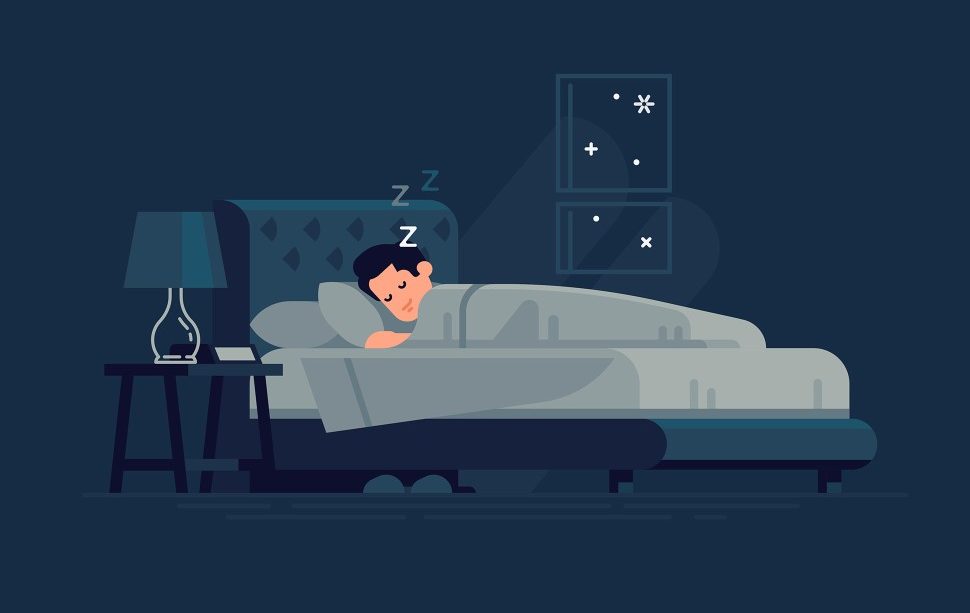Sleep is an essential part of our daily routine. Like food and water, it is fundamental for physical and mental health.
Characterised by decreased awareness and sensation, sleep is a physiological process where the body’s functions rest.
Moreover, it plays a vital role in many of the body’s essential functions, and the amount of sleep a person needs can vary based on individual and health conditions.
While some may require long hours of sleep, others can function well with just a few hours, depending primarily on factors like age. For healthy sleep, individuals need to go through the following two stages:
The Deep Sleep Stage
During this stage, body temperature drops, and muscles that might be tense from work or stress relax. The heart rate and breathing slow down, and physiological changes occur to enhance immune system performance and the secretion of hormones critical for growth and development.
Rapid Eye Movement (REM) Sleep
In this stage, the brain becomes active, dreams occur, and the body becomes immobile. Body temperature, blood pressure, heart rate, and breathing increase. This stage aids in learning, memory enhancement, and improving mental health.
The Importance of Sleep
Sleep significantly enhances the quality of life and maintains a natural rhythm. Its impact on adults and children extends beyond physical health to psychological, social, and mental aspects.
Lack of sleep or sleep deprivation can lead to various long-term problems and disorders, whereas adequate sleep is associated with multiple health benefits, such as:
Improved Concentration and Memory: Individuals who get enough healthy sleep have better concentration, productivity, and job performance.
Enhanced Immune System Function and Reduced Inflammation: Insufficient sleep weakens the immune system, increasing the risk of infections and infectious diseases.
Reduced Risk of Certain Diseases: Regular and sufficient sleep helps manage issues ranging from blood sugar levels to physical activity. In contrast, lack of sleep raises the risk of heart disease, stroke, diabetes, and obesity.
Improved Mental Health and Mood: Poor sleep increases negative reactions and the likelihood of psychological disorders like anxiety and depression.
Sleep Disorders
Insomnia: A common sleep disorder characterised by difficulty in obtaining sufficient deep sleep.
Sleep Apnoea: A condition where breathing repeatedly stops during sleep due to upper airway blockage or the brain’s failure to initiate breathing. These interruptions last 10 seconds or more, leading to decreased blood oxygen levels and frequent awakenings.
Restless Legs Syndrome (RLS): A disorder causing pain, tingling, and burning sensations in the legs, with a strong urge to move them during sleep. It can be hereditary or due to medications like antidepressants, or health issues such as iron deficiency, Parkinson’s disease, kidney disease, and diabetes.
General Guidelines for Improving Sleep Quality
Maintain a Regular Sleep Schedule: Go to bed and wake up at the same time every day, even on weekends, to regulate the body’s biological clock.
Prioritise Night Sleep: Make most of your sleep at night and limit napping during the day, as long naps can affect sleep quality.
Create a Comfortable Sleep Environment: Ensure the bedroom is quiet and at a suitable temperature, and avoid long exposure to light-emitting screens before bed.
Use Dim Lighting: Opt for dim lighting in the bedroom to stimulate melatonin production, which aids in achieving deep, restful sleep.
Engage in Relaxing Activities: If unable to sleep within 20 minutes, leave the bedroom and engage in relaxing activities like reading or listening to music, then return to bed when feeling tired.
Exercise Regularly: Engage in regular physical activity earlier in the day, ensuring any exercise ends at least three hours before bedtime.
Avoid Heavy Meals Before Bed: Refrain from consuming heavy and rich foods at least three hours before bedtime to prevent digestive issues and sleep disturbances.
Limit Caffeine and Sugary Beverages: Reduce intake of stimulants like coffee, tea, or energy drinks close to bedtime due to their caffeine and sugar content that can affect sleep quality.
Stay Hydrated: Drink water throughout the day but limit intake in the evening to reduce nighttime trips to the bathroom.
Practice Relaxation Rituals: Engage in activities that reduce overthinking and anxiety, such as turning off lights, reading, taking a bath, meditating, or practising yoga.
Consult a Doctor for Sleep Issues: If experiencing difficulty sleeping, consult a doctor to identify underlying causes and receive appropriate treatment to improve sleep quality.
By: Dr. Badreyya Al-Harmi, Consultant Public Health, Emirates Public Health Association













